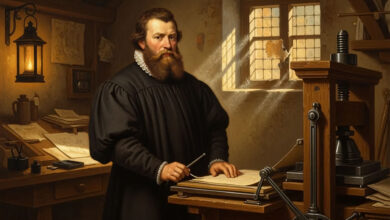Eleanor of Aquitaine was born in 1122 in Poitiers, France. She became one of the most powerful and influential women of the Middle Ages, serving as both Queen of France and Queen of England. Her intelligence, political acumen, and strong will allowed her to shape the course of European history, making her one of the most remarkable figures of her time.
Eleanor was the daughter of William X, Duke of Aquitaine, and Aenor de Châtellerault. As the heiress to the vast and wealthy Duchy of Aquitaine, she was one of the most sought-after brides in Europe. When her father died in 1137, she inherited the duchy, and later that same year, she married Louis VII of France. Shortly after their marriage, Louis became King of France, making Eleanor his queen consort. Their union, however, was troubled from the start. Eleanor was highly cultured and politically ambitious, while Louis was more devout and reserved. The couple had two daughters but no male heir, which further strained their relationship.
Eleanor joined Louis on the Second Crusade in 1147, travelling to the Holy Land in a display of leadership rare for a medieval queen. However, tensions between them grew during the campaign, particularly after their military failures and disagreements about strategy. Upon their return to France, their marriage continued to deteriorate. In 1152, their union was annulled on the grounds of consanguinity, leaving Eleanor free to make her own choice for a second husband.
Just months later, Eleanor married Henry, Duke of Normandy, who would soon become Henry II of England. Their marriage was a formidable alliance, bringing the vast lands of Aquitaine under the control of the English crown. In 1154, Henry was crowned King of England, and Eleanor became queen consort once more. Together, they had eight children, including Richard the Lionheart and John, both future kings of England.
Eleanor played an active role in governing Henry’s empire, overseeing her lands in Aquitaine and acting as regent when Henry was absent. However, their marriage was turbulent. Henry’s infidelities, combined with Eleanor’s strong personality and political ambitions, led to increasing tensions. By 1173, she was involved in a rebellion against Henry alongside their sons. The revolt failed, and Henry had Eleanor imprisoned for the next 16 years, holding her in various castles across England.
After Henry’s death in 1189, their son Richard the Lionheart ascended the throne. One of Richard’s first acts as king was to release his mother from captivity. Eleanor quickly reasserted her political influence, serving as regent while Richard was on the Third Crusade. She played a key role in maintaining stability in England and even travelled across Europe to secure Richard’s release when he was captured and held for ransom by the Holy Roman Emperor.
Eleanor’s later years were marked by continued political involvement. After Richard’s death in 1199, her youngest son, John, became king. She supported John’s reign but also worked to secure the succession of her grandson, the future Louis VIII of France, by arranging advantageous marriages. Even in her seventies, she travelled extensively, demonstrating her enduring commitment to her family’s fortunes.
Eleanor was not only a formidable political figure but also a great patron of the arts. She played a key role in the development of courtly love culture, which flourished in her court at Poitiers. Troubadours, poets, and writers found her patronage invaluable, and she helped shape the chivalric ideals that would define medieval European literature for centuries. Her court was known for its intellectual discourse, attracting some of the greatest minds of the era. She also supported the construction of religious institutions, including Fontevraud Abbey, where she would eventually be buried.
In 1202, Eleanor retired to the Abbey of Fontevraud, a place closely associated with the Plantagenet dynasty. She spent her final years in quiet contemplation, though she remained an important political figure until the end. Even in her later years, she played a role in securing peace between England and France. On 1 April 1204, Eleanor of Aquitaine passed away at the age of approximately 82. She was buried at Fontevraud Abbey beside Henry II and Richard the Lionheart.
Eleanor’s legacy is one of extraordinary resilience, intelligence, and power. She defied the limitations placed upon women in her time, taking an active role in governance, diplomacy, and even military affairs. As queen of both France and England, she influenced the course of European history, shaping the political landscape for generations. Her patronage of the arts helped to foster the development of courtly culture, and her descendants would go on to rule some of the most powerful kingdoms in medieval Europe. Her life remains a testament to the enduring impact of strong, determined leadership in a world dominated by men.
Her descendants include some of the most influential rulers in European history. Through her lineage, she was the ancestor of Edward III of England, whose claim to the French throne sparked the Hundred Years’ War. Her bloodline extended into numerous royal houses, further spreading her legacy across Europe. Her influence can also be seen in the legal and administrative reforms undertaken during her lifetime, many of which laid the groundwork for the governance of England and France for centuries. Eleanor’s life remains a subject of fascination for historians and scholars, and her legacy endures in popular culture. She has been depicted in numerous historical novels, films, and television series, often portrayed as a fierce and independent woman who shaped the destiny of nations. Her intelligence, wit, and political insight continue to inspire, making her one of the most compelling figures of the medieval period. Even centuries after her death, Eleanor of Aquitaine is remembered as a queen who defied expectations, carved her own path, and left an indelible mark on history.




